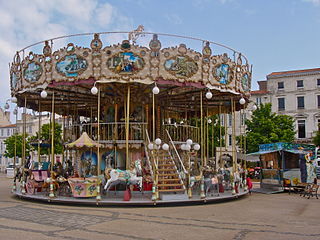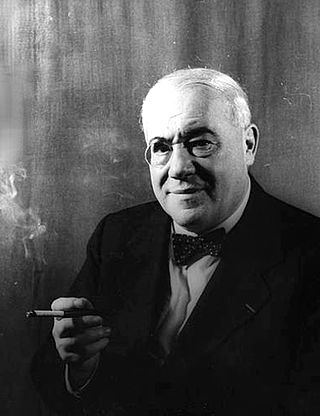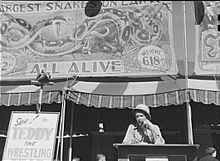
Carousel is the second musical by the team of Richard Rodgers (music) and Oscar Hammerstein II. The 1945 work was adapted from Ferenc Molnár's 1909 play Liliom, transplanting its Budapest setting to the Maine coastline. The story revolves around carousel barker Billy Bigelow, whose romance with millworker Julie Jordan comes at the price of both their jobs. He participates in a robbery to provide for Julie and their unborn child; after it goes tragically wrong, he is given a chance to make things right. A secondary plot line deals with millworker Carrie Pipperidge and her romance with ambitious fisherman Enoch Snow. The show includes the well-known songs "If I Loved You", "June Is Bustin' Out All Over" and "You'll Never Walk Alone". Richard Rodgers later wrote that Carousel was his favorite of all his musicals.
In North America, a sideshow is an extra, secondary production associated with a circus, carnival, fair, or other such attraction.

A libretto is the text used in, or intended for, an extended musical work such as an opera, operetta, masque, oratorio, cantata or musical. The term libretto is also sometimes used to refer to the text of major liturgical works, such as the Mass, requiem and sacred cantata, or the story line of a ballet.

Rodgers and Hammerstein was a theater-writing team of composer Richard Rodgers (1902–1979) and lyricist-dramatist Oscar Hammerstein II (1895–1960), who together created a series of innovative and influential American musicals. Their musical theater writing partnership has been called the greatest of the 20th century.

A carousel or carrousel, merry-go-round (international), or roundabout is a type of amusement ride consisting of a rotating circular platform with seats for riders. The "seats" are traditionally in the form of rows of wooden horses or other animals mounted on posts, many of which are moved up and down by gears to simulate galloping, to the accompaniment of looped circus music.

Carny, also spelled carnie, is an informal term used in North America for a traveling carnival employee, and the language they use, particularly when the employee operates a game ("joint"), food stand, or ride at a carnival. The term "showie" is used synonymously in Australia, while "showman" is used in the United Kingdom.

A midway at a fair is the location where carnival games, amusement rides, entertainment, dime stores, themed events, exhibitions and trade shows, pleasure gardens, water parks and food booths cluster. The midway is located between the entrance and the big top of a circus; thus, a carnival is essentially a travelling midway.

In scholastic philosophy, "quiddity" was another term for the essence of an object, literally its "whatness" or "what it is".

Ferenc Molnár, often anglicized as Franz Molnar, was a Hungarian-born author, stage director, dramatist, and poet, widely regarded as Hungary's most celebrated and controversial playwright. His primary aim through his writing was to entertain by transforming his personal experiences into literary works of art. He never connected to any one literary movement. However, he did utilize the precepts of naturalism, Neo-Romanticism, Expressionism, and Freudian psychoanalytic theories, but only as long as they suited his desires. "By fusing the realistic narrative and stage tradition of Hungary with Western influences into a cosmopolitan amalgam, Molnár emerged as a versatile artist whose style was uniquely his own."
"If I Loved You" is a show tune from the 1945 Rodgers and Hammerstein musical Carousel.

A traveling carnival, usually simply called a carnival, travelling funfair or travelling show, is an amusement show that may be made up of amusement rides, food vendors, merchandise vendors, games of chance and skill, thrill acts, and animal acts. A traveling carnival is not set up at a permanent location, like an amusement park or funfair, but is moved from place to place. Its roots are similar to the 19th century circus with both being fitted-up in open fields near or in town and moving to a new location after a period of time. In fact, many carnivals have circuses while others have a clown aesthetic in their decor. Unlike traditional Carnival celebrations, the North American traveling carnival is not tied to a religious observance.

Liliom is a 1909 play by the Hungarian playwright Ferenc Molnár. It was well known in its own right during the early to mid-20th century, but is best known today as the basis for the Rodgers and Hammerstein 1945 musical Carousel.

Robert Hugh "Hadley" Fraser is an English actor and singer. He made his West End debut as Marius Pontmercy in Les Misérables. He also originated the role of Tiernan in the Broadway show The Pirate Queen.

Carousel is a 1956 American drama fantasy musical film based on the 1945 Rodgers and Hammerstein stage musical of the same name, which in turn was based on Ferenc Molnár's 1909 non-musical play Liliom. The film stars Gordon MacRae and Shirley Jones and was directed by Henry King.

The Sideshow was a one-hour Australian television comedy/variety series that was broadcast on ABC TV in 2007. The show was a mixture of stand-up comedy, sketches, live music, circus acts, cabaret and burlesque. Hosted by Paul McDermott, The Sideshow regularly featured performances and sketches by Claire Hooper, Flacco, The Umbilical Brothers, and Tripod.
"Soliloquy" is a 1945 song composed by Richard Rodgers, with lyrics by Oscar Hammerstein II, written for their 1945 musical Carousel, where it was introduced by John Raitt. Gordon MacRae performs the song in the 1956 film version.
Liliom is a 1930 American pre-Code drama film directed by Frank Borzage and written by S. N. Behrman and Sonya Levien. The film stars Charles Farrell, Rose Hobart, Estelle Taylor, H. B. Warner, Lee Tracy and Walter Abel. It was an adaptation of the 1909 play of the same name, serving as the first sound version of the film and the first of two sound adaptations of the play in the 1930s, with a 1934 adaptation being directed by Fritz Lang. The film was released on October 5, 1930, by Fox Film Corporation, who also handled the 1934 film. Alongside Just Imagine, also released by Fox, this was one of the first films to employ Rear projection, which is done during a train sequence.

Liliom is a 1934 French fantasy film directed by Fritz Lang based on the 1909 Hungarian stage play of the same title by Ferenc Molnár. The film stars Charles Boyer as Liliom, a carousel barker who is fired from his job after defending the chambermaid Julie from the jealousy of Mme. Muscat, the carousel owner who is infatuated with Liliom. He moves in with Julie and they begin an affair. When Liliom discovers he's about to become a father, he finds he needs money and participates in a robbery which goes awry. Rather than allow himself to be arrested, Liliom kills himself and his soul is transported to a waiting room of Heaven. A heavenly commissioner determines that Liliom will not be admitted into Heaven, only Purgatory, until he returns to Earth to do one good deed.

John Eckhardt Jr,, professionally billed as Johnny Eck, was an American freak show performer in sideshows and a film actor. Born with sacral agenesis, Eck is best known today for his role in Tod Browning's 1932 cult classic film Freaks and his appearances as a bird creature in several Tarzan films. He was often billed as "The Amazing Half-Boy", "King of the Freaks" and "The Most Remarkable Man Alive".
Carousel is a 1967 television movie, produced as an Armstrong Circle Theatre special. It is based on the stage musical Carousel. It was produced by Norman Rosemont.















